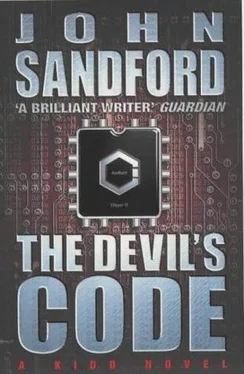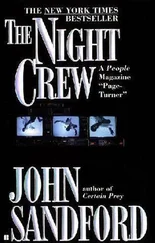"Yeah. We're blessed with individualism," I said.
We spent the rest of the ride in idle chitchat; and I sort of took her in, physically. She was pretty, with a good figure, but a figure that came from a careful diet, rather than exercise; a magazine-model's figure, not an athlete's.
She had an undergraduate degree from Berkeley in philosophy and mathematics, and a couple of graduate degrees in computer science from Stanford. She now lived in Palo Alto and divided her time between an Internet start-up and teaching at Stanford. The start-up, called e-Accountant, would provide billing, collection, accounting, and tax services to Web sites too small to efficiently do it on their own. She expected to get modestly rich from it. She was no longer married to the guy named Ward.
"He always said he wanted children, but he always wanted one more thing first," she said. "A car or a boat or a house or a vacation place. I told him that I couldn't wait any longer, and if he didn't want to start on a kid, I was going to pull the plug. Even then, he couldn't decide."
"So you pulled the plug."
"Uh-huh."
"Any candidates for the eventual fatherhood?" I asked.
"Yes. A very nice man at Stanford, an anthropologist. He's working on his own divorce."
"Ah. Were you involved in his problem?"
"No. He doesn't even know he's a candidate for the new position," she said. "Although he should be getting that idea pretty soon, now. He'll be an excellent father, I think."
"Good for him," I said.
The cab driver's eyes came up in the rearview mirror, and I caught him smiling. Pretty women are easily amusing.
I'm not sure how glad your heart should be when you arrive home in a taxicab with the grieving sister of a friend who'd just been shot to death, but when the cab dropped us, I was happy. Always happy to head up north, always happy to get back. The water gives you ideas, and if you're up there long enough, you develop an irresistible urge to work, to get the ideas on paper. Bleak was the same way; leave him in a cabin long enough, and he'll start improving the furniture with his pocket knife.
And things were going on around home. We had to walk up five flights of stairs because the elevator was jammed full of Alice Beck's stoneware and porcelain pieces, which she was moving out for a show. Alice yelled down the atrium, "Sorry, Kidd, we'll be out in ten minutes." We traipsed on up the stairs, me with the duffel and rod tubes, Lane carrying the tackle bag.
We stopped on the third floor for a moment, so Lane could look at some of Alice 's vases. She liked them, and Alice invited us to the opening, two days away.
Lane shook her head. "I'd love to, but we've got a funeral to go to," she said, and we continued on up. At the next flight, she looked down and said, quietly, "Beautiful stuff," and I nodded and said, "People say she's as good as Lucie Rie, but I'm afraid she's gonna burn the building down some day. She's got a Marathon gas kiln in her back room. I can hear it roaring away at night, that whooshing sound, like the cremation of Sam McGee."
"Is that legal?"
"The cremation of Sam McGee?"
"No, stupid: the kiln."
"I doubt it," I said.
"Have you complained?"
"Nah. I helped her carry it up."
Home; and the Cat was in.
He was sitting on the back of the couch, looking out at the Mississippi, a red tiger-stripe with a head the size of a General Electric steam iron. He didn't bother to hop down when I came in. In fact, he pretended not to notice. An old lady artist downstairs, a painter, kept him fed for me while I was gone, and he had his own flap so he didn't need a cat pan except in deepest winter.
"Hey, Cat," I said. He looked away-but he'd come creeping around about bedtime, looking for a scratch.
"He looks like you," Lane said.
"Who?"
"The cat."
"Thanks." I supposed that could be a flattering comment; on the other hand, the Cat was pretty beat up. One ear had been damn near chewed off, and sometimes, on cold mornings, he'd limp a little, and look up at me and meow, like he was asking for a couple of aspirin. I dumped the duffel, stepped into the kitchen, and said to Lane, "Tell me about Jack," and asked, "Want some coffee?"
She agreed to the coffee. "I think he was murdered," she said, as we waited for the water to heat in the microwave. "He was supposedly shot to death after he broke into a secure area of a company called AmMath in Dallas. He was shot twice in the chest and died immediately. Another man was wounded."
"But not killed?"
"Not killed."
"So he could tell you what they were doing." The microwave beeped and I took the cups out.
"No, no, no. The man who was wounded was supposedly shot by Jack," she said. "They say that Jack had a gun and opened fire when he was caught. There were two guards or security men, whatever you call them, and supposedly, Jack shot one, and the second guard shot Jack."
"Jack?" You had to know him.
"Exactly," she said. "There's no way that Jack would shoot at somebody. He wouldn't shoot at somebody to save his own life, much less to keep from getting caught in a burglary, or whatever he was supposedly doing. Unless." She looked sideways at me, and her eyes sort of hooked on.
"Yeah?"
"Unless, working with you, you taught him to take a gun along. A technique, or something."
I shook my head: "Never. I never take a gun. The only thing you can do with a gun is shoot somebody. I'm not gonna shoot somebody over the schematics for a microchip."
"That's what he told me," she said. "That nothing you did involved violence."
Nothing that Jack knew about involved violence, I thought. But violence had been done, a time or two or three, as much as I tried to avoid it, and regretted it. Or, to be honest, as much as I regretted some of it. I'd met a sonofabitch down the Mississippi one time, who, if he came back from the dead, I'd cheerfully run through a stump chipper.
"What was Jack doing?" I stirred instant coffee crystals into the hot water and handed her a cup. She had a way of looking at you directly, and standing an inch too close, that might have bent the attention of a lesser man.
"Nobody will say exactly. All they will say is that he entered a high-security area in AmMaththey're the people doing Clipper IIand that he opened fire when they walked in on him," she said.
Clipper II was an Orwellian nightmare come true, a practical impossibility, or a huge joke at the taxpayers' expensetake your pick. It was designed in response to a fear of the U.S. government that unbreakable codes would make intercept-intelligence impractical. And really, they had a point, but their solution was so draconian that it was doomed to failure from the start.
The Clipper II chiplike the original Clipper chip before itwas a chip designed to handle strong encryption. If it was made mandatory (which the government wanted), everyone would have to use it. And the encryption was guaranteed secure. Absolutely unbreakable.
Except that the chip contained a set of keys just for the government, just in case. If they needed to, they could look up the key for a particular chip, get a wiretap permit, and decrypt any messages that were sent using the chip. They would thereby bring to justice (they said) all kinds of Mafiosos, drug dealers, money launderers, and other lowlifes.
Hackers, of course, hated the idea. They were already using encryption so strong that nobody, including the government, could break it. The idea of going back to less secure encryption, so that the government could spy on whoever it wanted, drove them crazy. No hacker on earth really believed that the government would carefully seek wiretap permits before doing the tap. It'd be tap first, ask later, just like it is now with phone taps.
The good part of the whole controversy was that everybody seriously concerned with encryption knew it was too late for the Clipper II. It had been too late for the Clipper I a decade earlier. Strong encryption was out of the bag, and it would be impossible to push it back in.
Читать дальше












